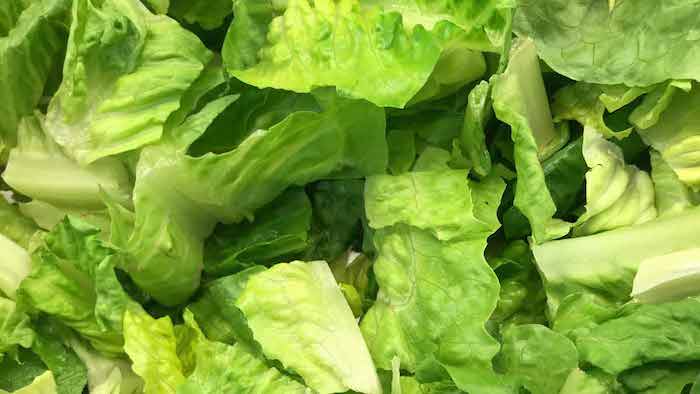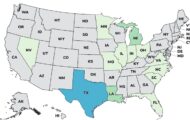In 2021, health departments in Washington and Minnesota did something that doesn’t happen very often. They solved an E. coli outbreak linked to leafy greens.
“It is rare to be able to identify the outbreak vehicle for commercially distributed food like romaine lettuce (much less link back to a farm source) with only four laboratory-confirmed cases who consumed the romaine lettuce at four different restaurant locations in two states,” Doug Schultz, an information officer at the Minnesota Department of Health told Food Poisoning Bulletin. The outbreak was never announced because, by the time investigators identified the specific grower, there was no ongoing risk to the public, he said.

Stream of Unsolved Outbreaks
Leafy greens recently overtook ground beef to become the leading source of E. coli illnesses in the U.S. When it comes to outbreaks, no other member of the leafy greens family causes more of them than romaine. But solving these outbreaks comes with challenges:
- The product has a short shelf-life which limits the testing and tracing window.
- Many traditional (not greenhouse) growers keep poor records.
- Some growers with fields that neighbor cattle feeding or grazing operations don’t take precautions to assure that the agricultural water they use is safe.
- Some growers with fields that neighbor cattle feeding or grazing operations don’t take steps to assess and mitigate risks associated with adjacent and nearby land use.
- Leafy greens that are not sold whole are processed by companies with many customers.
- Leafy greens from different farms are often mixed together at processing facilities.
In recent years, there has been a steady stream of unsolved E. coli outbreaks where leafy greens were the suspected source. Just last year, federal officials declared the source of a six-state E. coli O157:H7 outbreak “unknown” even though more than 80 percent of the patients reported eating Wendy’s burgers or sandwiches containing lettuce before they became ill. Wendy’s uses a romaine hybrid for its sandwiches and a different lettuce for its salads. That outbreak ended with 109 illnesses and 52 hospitalizations. Thirteen people developed hemolytic uremic syndrome (HUS), a form of kidney failure associated with E. coli infections.
“Two things that were really alarming about this outbreak were the number of HUS cases and the hospitalization rate, which was more than twice the average,” said Food Poisoning Bulletin Publisher Eric Hageman, a noted food safety attorney whose firm represented clients sickened in this outbreak.
E. coli Strain Linked to Fatalities in Multiple Outbreaks
In March 2021, federal investigators closed without solving an investigation into a seven-state fatal E. coli outbreak that caused unusually severe infections among 22 patients. Eleven people were hospitalized, three of them with HUS. One person died.
Investigators weren’t able to identify a food source, but genetic tests showed the outbreak strain was the same one linked to a 2018 Yuma, AZ -grown romaine E.coli outbreak that killed five people, a deadly 2020 E. coli outbreak where leafy greens were a suspected source and another deadly E.coli outbreak that occurred in late 2021. Together these four outbreaks resulted in 274 illnesses, 126 hospitalizations, 33 cases of HUS, and eight deaths
Another E. coli Strain Linked to Multiple Outbreaks
In November 2019, the CDC announced an outbreak linked to romaine lettuce grown in Salinas, CA. That outbreak, which included two smaller outbreaks -one linked to Ready Pac Bistro Chicken Caesar Salads, the other linked to Fresh Express Leafy Green Romaine, sickened a total of 167 people in 27 states. Fifteen people developed HUS. Even though the outbreak strain was identified in the salads mentioned previously, the source of this outbreak was “unknown” when the investigation ended.
The E. coli strain that caused the 2019 Salinas-grown romaine outbreak was linked to a 2018 romaine E. coli outbreak that sickened 62 people and a 2017 E.coli outbreak linked to leafy greens that sickened 25 people killing one of them.
The Solved 2021 Chipotle and Panera Romaine E. coli Outbreak
The Washington State Department of Health discovered that two clinical isolates in that state and one ore in Minnesota were caused by the same Shiga toxin-producing E. coli O121:H19 strain, according to genetic tests. The two Washington E. coli patients had eaten at two different Panera Bread restaurants.
On December 13, 2021, the Washington health department called the Minnesota Department of Health (MDH) to alert them to the match. Two days later Minnesota found another one and opened an investigation.
The two Minnesota patients had eaten at two different Chiptole restaurants in Rochester so the parameters for the outbreak were to include customers who were Minnesota residents who tested positive for the outbreak strain from November 20, 2021, to December 1, 2021, or were customers who ate at a Chipotle in Rochester during that time period and tested positive for Shiga toxin-producing E. coli at a clinical laboratory or ate at a Rochester Chipotle and developed diarrhea that lasted at least three days.
Five Minnesota cases were identified -“two culture-confirmed E. coli O121:H19 cases, two cases who reported eating at one of the two Chipotle locations and were positive for STEC at a clinical laboratory but not culture-confirmed [by MDH], and one case who met the illness case definition but did not submit a stool specimen for testing,” according to the MDH report on the outbreak. None of the patients developed HUS or were hospitalized.
A traceback investigation (tracing back where the romaine served at the restaurants came from) was conducted by the Minnesota Department of Agriculture and the U.S. Food and Drug Administration. Through this process, investigators were able to determine that Reinhart Foods supplied romaine to the two Rochester Chipotle locations on November 20 and November 23, that Reinhart Foods received that lettuce from Taylor’s Farms in Salinas, CA, and that the lettuce was grown in Salinas.
Meanwhile, the traceback investigation from the two Panera restaurants also led to Taylor’s Farms in Salinas and one ranch supplied the implicated lettuce to all four Panera and Chipotle locations.

If you have been sickened with a food poisoning infection, please contact our experienced attorneys for help with a possible lawsuit at 1-888-377-8900 or text us at 612-261-0856. Our firm represents clients in lawsuits against grocery stores, restaurants, and food processors.




